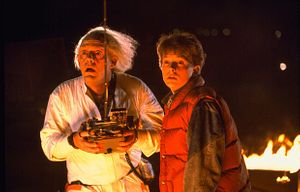The time travel adventures of Dr. Emmett Brown and Marty McFly in a DeLorean time machine are useful in predicting a limiting feature of the future of war. Although it is widely viewed that technology determinism will regulate future hostilities, the modern penchant for scientific reduction fuels the belief — if not the hope — that future wars will be driven if not dominated by new technologies. In its time shuffling thaumaturgy, the Back to the Future trilogy offers a counternarrative to this somewhat misguided assumption.
The character arc of Doc Brown in the trilogy is his gradual transformation from a scientist believing in the omnipotence of technology — the DeLorean time machine — to a philosophical doubter embracing the inherent unpredictability of human actions and, as a consequence, the future. As Doc tells Marty’s girlfriend Jennifer in the last scene of the trilogy, “Your future is whatever you make it” — irrespective of the DeLorean.
The future of war is also what we make of it, notwithstanding technological innovation.
This is not to say that technology is not important in determining the future of military conflict. My point is that it is not the only determinant. Doc Brown had to learn it the hard way. It was ultimately the unpredictability and complexity of human beings that checked his attempts to influence the future by technological means, forcing him to conclude that the “infernal [time] machine” needed to be destroyed as time traveling has “become much too painful.”
The current Zeitgeist, however, inspired by the Silicon Valley gospel of technological solutionism, continues to emphasize technological determinism when analyzing and predicting the future of war, as a recent Special Report by The Economist on the subject succinctly illustrates. The report could have been renamed “The Future of Military Technology” rather than “The Future of War” as it primarily covers new military technologies.
One of the results of this emphasis on new technologies is that we still think we can engineer ourselves to military victory. As U.S. Deputy Secretary of Defense Patrick Shanahan recently said, “There’s a technical solution for everything.”
The other major insight of Doc Brown’s axiom, next to forcing us to look beyond scientific reification, is that the future of war is indeed what we make of it. We have a powerful influence in constructing any future of war narratives. If that narrative emphasizes the transformational nature of technology, the same way that, for example, pre-World War I narratives emphasized the offensive spirit of troops, it may turn out to be a self-fulfilling prophesy regardless of the actual reality.
In the run up to World War I, all European militaries emphasized offensive operations while disregarding technological changes that strengthened defense. The result was a bloody stalemate. Today, the reverse could be true. If other countries buy into the technology narrative prevalent in the United States, as some already have, future wars may end in similar deadlocks with both sides fielding technologically sophisticated weaponry, while lacking tactical, operational, and strategic innovations to use them creatively and decisively. Under such a scenario, technology will likely not be the decisive factor in bringing about military victory even when it substantially shapes the nature of future military conflict.

































